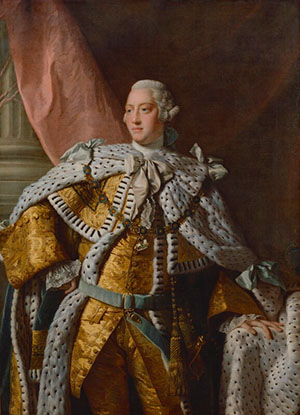
Queen Elizabeth II not long ago opened a vast trove of documents relating to King George III, the king scorned and pilloried in the Declaration of Independence. This new source has resulted in a new biography by Andrew Roberts, The Last King of America: The Misunderstood Reign of George III.
It’s a thick and weighty book, and I’m only to just after George succeeded his grandfather to the throne of England. (His father, Frederick, died when George was 12.) The Seven Years War was being waged all around the world. When the peace treaty was signed, all sorts of territories and colonies got re-arranged — including the ceding of French Canada and Spanish Florida to England.
One might press the point that England gaining control of the northern and southern flanks of the 13 original colonies opened a path for independence.
I look forward to (slowly) reading through George’s life, but thought the excerpt below might interest the readers of Orange County Breeze:
Insofar as they thought about such issues at all, most British politicians of the time shared a strong commitment to the absolute sovereignty of the Westminster Parliament in all matters concerning the empire. British government interference in the internal affairs of the colonies had been minimal before the Seven Years War, other than enforcing the Navigation Acts, which required that exports from the colonies be transported in British ships. The assumption — championed by Louis XIV’s First Minister Jean-Baptiste Colbert but widely accepted — was that trade was power, because profits from it could be churned back into war material via taxation. So it was in the interests of all Britons — on both sides of the Atlantic — to do as little trade as possible with potentially hostile states such as France, Spain and Holland, and as much as possible with each other. This Colbertian protectionist policy would prevent foreign manufacturers and merchants from making profits that could be made by Britons and Americans instead.
Because British official circles thought in imperial not insular British terms, Britons were similarly prevented from buying all but the most expensive luxury French goods by prohibitive tariffs. The American colonists were expected, as overseas Britons, to trade within the guidelines of a policy intended to weaken France as much as possible. This mercantilism was intended to be not anti-American but anti-French. In any case, the regulations were routinely flouted by mass smuggling as the profit motive and demand for cheaper, untaxed goods in the thirteen colonies had their effect.
By the time of the Peace of Paris [which ended the Seven Years War], relations between Britain and her American colonies clearly had to be regulated. Successive attempts at reform that had been shelved during the War of Austrian Succession [1740-1748] and the Seven Years War were now dusted off and looked at anew. The colonists’ widespread ignoring of the Navigation Acts, their continued push to the west of the Appalachians (and propensity to start wars against the Native Americans, many of whom had been British allies against the French) and the tax-and-spend power of colonial assemblies vis-à-vis those of the Crown-appointed colonial governors all needed to be settled. There were huge opportunities for the empire if these were handled carefully, but great pitfalls if they were not. Yet, for reasons that were largely unconnected with what was happening in North America, Westminster now entered into a seven-year period of endemic factionalism and political strife in which the governance and taxation of Americans became a political dispute between shifting alliances of competing politicians, and genuine statesmanship was in very short supply.
Balance this bit of history against current trade woes and international political turmoil as we head towards Independence Day and celebrate a truly inspired and successful piece of political propaganda, our own Declaration of Independence.
